Photographs: Seema Pant
It is hard to spot Madhuri in a bunch of men. She is the youngest of the group and looks like a teenaged boy. Her once long hair is cut short, the tiny frame is clad in jeans and shirt; a pair of red sneakers match her striped shirt.
An orange stone ring adorns her right hand in which she had held a 12 bore 303 rifle at age 10.
One night the Naxals had come to the village and taken her away. They did not force her, she says, but had spoken to her nicely. She was trained in armed combat and guerilla tactics; learned how to make and plant bombs, ambush police patrols and attack police posts. She also served in the Naxal medical team, administering injections and nursing injured comrades.
Her first assignment was to teach A B C D to the uneducated in the camp. On another assignment she struck a policeman with ten lathi blows while another comrade slit his throat.
Then one day disillusioned by her leaders, she wrote a letter to her comrades and left. They came back and asked her to return, but she refused. Fearful of the consequences on her three younger siblings because of her return, she surrendered to the police and has been working as a special police officer with the Chhattisgarh police.
After her return, life has been tough, but better than what it was in the jungles. She is paid Rs 3,600 a month and hopes to be selected as a constable with a permanent, better paying government job.
On a hot summer day, Madhuri, whose name has been changed for fear of retribution by the Naxals, remembers her difficult past and looks into the uncertain future.
"When I was young and studying, the Naxalites came and took me. I lived in my village and have studied till class VIII. My school was 5, 6 kms away and I used to cycle to school. Then teaching stopped in my school (actually I did not complete class VI) -- I went to the next village for private classes to appear for class VIII. I had three sisters and mother in the village. I have no recollection of my father. My sisters are all younger to me.
They (the Naxalites) came to my home in the night and took me. I had come home in the village after giving my class VIII exam. They were the platoonwale -- the military dalam -- commander Jaymati came to my house. They were four -- the remaining stayed in the jungle. They said 'You don't have a father, you can come and work for the party.' They did not show any force, they spoke nicely.
I had seen them in the village before and they used to talk to me. But I did not know who they were. They did not tell me what they did."
'I learned how to handle a gun when I was 10'
Image: The road to Bastar. Image for representational purposes.Photographs: Seema Pant
I was 10. I did not know that they did all this till I got there.
We were in South Bastar and training was rigorous. We used to wake up at 4 am for PT and drill, followed by breakfast of poha and then studies. They taught us about the teachings Mao and their way of life.
ABCD was also taught to those who were totally illiterate. After studies we had lunch and two hours rest followed by PT, drill, training and tea.
In the night after dinner we went to the jungle for night training. There were 30 of us in this training -- 5, 6 were girls. Later we were sent to a larger camp for training, here we were taught how to draw maps of police stations, how to gherao police posts, how to snatch a rifle from a constable. We were trained by military commanders. In this camp we were 15 girls in my batch. There were 4 to 5 batches getting trained there.
Here also our routine was almost the same. In the morning we used to have a roll call and they also gave us training in self defence in case we came under attack.
'My mother died when I was in the jungles. I do not know when'
"My mother died when I went to the dalam (squad). I don't know exactly when, she passed away while I was gone in the jungles. My younger sisters were left alone in the village but I could not come back for the fear of the party and that the police would nab me. I also thought that since my mother was no more, what was there for me in the village? Perhaps my sisters would be better off without me."
'My first posting was as a teacher'
After my military training, I was sent to my first posting. Here my duty was to teach those who did not know how to read and write. A year later I became like a sipahi (armed comrade). Then after this they sent me to the medical team. I used to check fever, give injections and saline drip.
Serious cases used to also be brought here, operations also used to be done. Sometimes doctors from the city came to the forest to do operations. I stayed in the Bastar area and did not travel elsewhere.
'I struck the policeman with a danda 10 times'
Image: A file photograph of Naxals in the jungles of Chhattisgarh.Photographs: Chindu Sreedharan
In the camp they give orders and tell you that today you have to kill. If they order you to kill, you have to do so. They allocate the duties during roll-call, you can't be scared, you have to carry out what they tell you. You have to do it.
I was once caught in a crossfire. We had gone for the mission in the night. It was during the elections and we had to plant a bomb, but the cops found it and defused it. I know how to make a bomb -- I know all types of bomb making. I know all the rules and regulations of the Naxals.
'I was scared, but slowly the fear receded'
When I was new in the camps, I was scared, but slowly the fear receded. I was scared that the men would do wrong deed with me. It never happened to me but it had happened to other girls. Not so much by the Bastar people, but these acts were done more by the Andhra people. It happened to one of my friends Meena by a man from Andhra. Nothing untoward happened to me. It also depends on how you conduct yourself.
When couples get married over there, they operate upon the boys so that women don't become pregnant. Some couples flee for this reason. In the dalam (squad), even if they are married, they go with other women also. They tell villagers that bigamy is not right and there was this commander who himself ran away with two wives. This is wrong.
They don't even give any money for the work they make you do. The commanders keep all the money and sometimes run away with it. Even if you ask they give you no money. They get crores of rupees. The leaders don't fight on the ground as we do. They don't do guard duty, their job is to go to villages and make sangathan (organisations) and hold meetings.
'Why I returned'
Image: National Highway 43 connects Bastar to Raipur. Image for representational purposes.Photographs: Seema Pant
The Naxalites say they have no desire for money, then why do they run away with the money? What are they struggling for then?
They say this struggle is for establishing their own government. They say they will wipe out the police and set up their own government. That our lives will improve, but I know that is untrue. It won't happen.
Those who work with them will also realise this sooner or later. Sometimes the villagers don't know that the Naxals are fighting with the police.
I wrote a letter telling them that I was not their enemy and left. That my sisters were alone and the other reason was that the other senior party leaders had abandoned and betrayed the party.
I returned to my village and they tried to woo me back. They sent me a letter asking me to come back, because I did a good job while there. They came back twice asking me to return. They wanted me to tell them the reasons for leaving and said I could then leave if I still wanted to.
Sujata, the secretary, sent me the letter. I went back and told them that I didn't want to work with them. After that they used to come to my village and abuse me saying that after being with them now I had left them.
I told them that others had also left in the past. Why should I be singled out? When the big leaders abandon the party no one questions them whereas I hadn't caused any harm to the party. When other senior leaders have also left the party, aren't they also wrong if I am wrong?
I left because what was the point of staying there when big leaders weren't themselves committed about staying in the movement. On one day they say they are struggling for the party, on the next day they are leaving. They tell us that we shouldn't leave the party, the consequences of leaving being death -- why don't they kill those big leaders who leave? They don't leave empty-handed, unlike us they take the money and run. In south Bastar there were two commanders who left, while I came from the lower rungs.
'We don't like the Andhrawallahs. They loot the Bastarwallahs'
We were from Bastar who did not know the ways of the big [Naxal] leaders from Andhra Pradesh.
The Andhrawallahs are more educated than the Bastarwallahs.
The Andhrawale teach party politics to villagers and they themselves leave the party and run away. Why do these leaders leave the party? There has to be some reason, some weakness in the party.
We, especially the girls, don't like the Andhrawale. They pressurise girls to get married. Some of these commanders extort money from their areas, get married and then run away with the money of Bastar to build a life in the city. They make fools of villagers here (in Bastar) who support them out of helplessness. The villagers wouldn't support them otherwise.
There was this senior area commander who left them. They caught and killed her. She was not an enemy of theirs but they killed her. If the Andhrawale leave they don't kill them, they only kill the Bastarwale.
The Andhrawale put our people on the frontlines and it is our people who get killed.
Andhrawale come and loot the Bastarwale. They extort money from villagers and tendu patta [used for making bidi] contractors and take the money away to Andhra. They haven't killed anyone from Andhra for doing this, they take no action against them. They would have killed anyone from Bastar for doing the same thing. They forcefully make villagers to work with them.
I came to know all this after I joined them. I wouldn't have gone to them had I known this.
Once you go there and return, there is a grave danger. I am not scared any more, it is behind me. They can kill me but how many times can you kill one person? I went there because I was not in the right mind.
'It is tough to defeat the Naxals'
Image: Naxalites in a Chhattisgarh jungle. The Naxal trouble in the state began in the mid 1980s.Photographs: Chindu Sreedharan
I thought since I had studied till class VIII, at least I could get some job here. I now assist the police in operations. I also go for search operations with the police. I carry a rifle like them.
There are no other girls who go for patrols. I take the INSAS but that is not a very good gun, the SLR and 303 are better rifles. When I was there I used the 12 bore 303.
When the cops send me on patrol, I never refuse. I wear a commando uniform when I go. Even though I am a girl, I go wherever they ask me to. I am ready to work, even while I was with the Naxals I was willing, even here it's the same.
I just returned from a patrol two days ago. We were in the forest for ten days. We go half way in a vehicle and change the route and then go on foot patrol. They will blow our vehicles otherwise. The Naxalites do their own surveys. We didn't find anything on the last patrol.
Today is my rest day. My body is paining after walking for 10 days and nights. During the patrol we don't sleep, we keep walking. We live off the jungle and don't stop we can't stop in a Naxal area, otherwise they will attack us.
I also identify the Naxals. I know them all, the entire party. They (the Naxals) also know that now I am helping the police in identifying them.
'I don't fear death, they can kill me once, not everyday.'
'Now they are my enemies but what can I do?'
Now I want to be a sipahi (constable)). As an SPO I get Rs 3,600 and one room to stay. If I get a sipahi's job it will be better. 3,600 is very less, though senior police officers help me. To become a sipahi I have to give an exam since I gave up my studies long time ago I am not confident. I am confused.
I feel it would be good if I became a sipahi it would secure my future and I could look after my family. I would earn Rs 10,000 TO Rs 11,000 then.
'It is tough to defeat the Naxals'
It is tough to defeat them. You need a substantial and committed force. The policemen have their families, the Naxals don't, they only know how to fight the guerilla war.
The Naxals don't allow schools to be built why should schools be their enemy?
They tell the villagers that the police exploit them and rape their women. Naxalites also do wrong deeds. Not all but some do.
I wasn't scared while there nor here. I don't think about tomorrow. I only want a sipahi's job. They know about me that I go for patrols and identify them to the police. They think if any Naxal is caught, it is because I have told the police about him/her. Mine is the first suspicion they have. I wasn't scared when I was in the jungles so why should I be scared in the city?
'I have not thought about marriage'
There was another girl who surrendered with me. She is fairer than me. She is older than me, but looks younger, her face has the innocence of a child and she is more beautiful.
My aim is to secure a job first. If I go to my village, the villagers will beat me for joining the police because they are also Naxalites. We SPOs feel a lot of threats. I don't go to see my sisters because then the villagers will drive my sisters away. For my sister's sake I don't go there.
I haven't seen my sisters in 3, 4 years, I had stayed in my village after I came back -- before my surrender. I have no news of my sisters. I want to meet them but can't because if I go they will kill me. Now I will live my life alone, on my own.

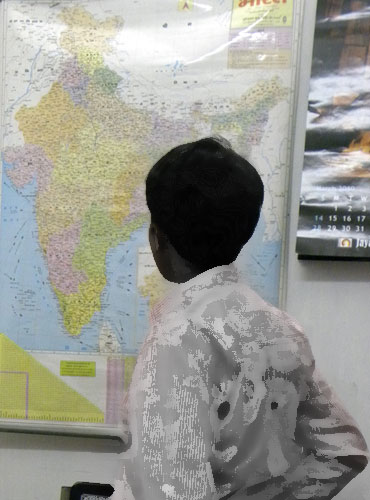
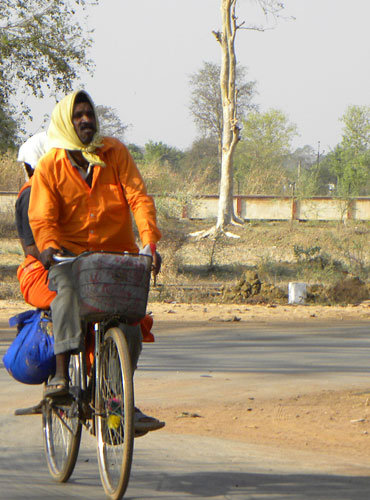
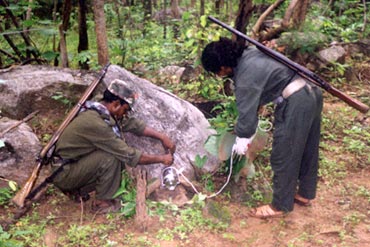
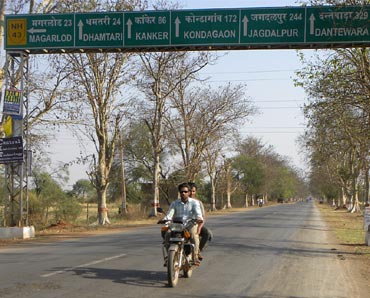
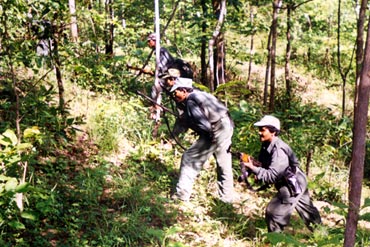
article